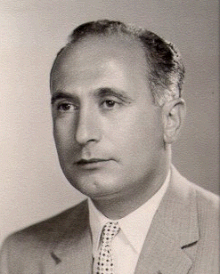Loading AI tools
Iranian historian and linguist (1920–2018) From Wikipedia, the free encyclopedia
Ehsan Yarshater (Persian: احسان يارشاطر; April 3, 1920 – September 1, 2018)[2] was an Iranian historian and linguist who specialized in Iranology. He was the founder and director of the Center for Iranian Studies, and Hagop Kevorkian Professor Emeritus of Iranian Studies at Columbia University.
Ehsan Yarshater | |
|---|---|
احسان یارشاطر | |
 Portrait photograph, January 1950 | |
| Born | Ehsanollah Yarshater[1] April 3, 1920 |
| Died | September 2, 2018 (aged 98) Fresno, California, U.S. |
| Nationality | Iranian |
| Alma mater | University of Tehran School of Oriental and African Studies University of London |
| Occupations |
|
| Years active | 1953–2018 |
| Known for | Director of the Center for Iranian Studies at Columbia University |
| Notable work | Encyclopædia Iranica |
| Spouse | Latifeh Alvieh (died 1999) |
| Parent(s) | Hashem Yarshater (father) Rohaniyeh Misaghie (mother) |
| Awards | Bita Award (2015) |

He was the first Persian full-time professor at a U.S. university since World War II.[3]
He was one of the 40 editors of the Encyclopædia Iranica,[4] with articles by 300 authors from various academic institutions. He also edited the third volume of The Cambridge History of Iran, comprising the history of the Seleucids, the Parthians, and the Sassanians, and a volume entitled Persian Literature. He was also an editor of a sixteen-volume series named History of Persian Literature.[5] He had won several international awards for scholarship, including a UNESCO award in 1959, and the Giorgio Levi Della Vida Medal for Achievement in Islamic Studies from UCLA in 1991.[6] Lecture series in his name have been instituted at the University of London, and the University of California, Los Angeles, and at the Centre National de Recherche Scientifique in Paris.
Born in Hamedan, Iran, Ehsan Yarshater studied Persian language and literature at the University of Tehran and Iranian philology (Old and Middle Iranian) at the School of Oriental and African Studies (SOAS), University of London with Walter Bruno Henning. His Tehran University dissertation dealt with Persian poetry under the Timurid Shahrukh (15th century).[7] His University of London dissertation, elaborated and published later as A Grammar of Southern Tati Dialects (Mouton, 1969), describes a series of Tati dialects spoken in the southwest of Qazvin.
He had published a number of articles on modern western Iranian dialects, notably Tati and Taleshi, and the Jewish dialects of Persian (including Lotara'i), and on Persian mythology.
His parents were Iranian Jews who had converted to the Baháʼí Faith, but he had no affiliation with the Baháʼí Faith as an adult.[8][9]
Seamless Wikipedia browsing. On steroids.
Every time you click a link to Wikipedia, Wiktionary or Wikiquote in your browser's search results, it will show the modern Wikiwand interface.
Wikiwand extension is a five stars, simple, with minimum permission required to keep your browsing private, safe and transparent.